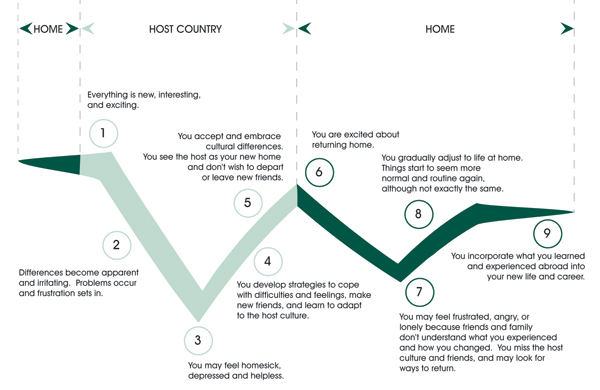
 Emotional wellness involves how one feels, thinks and copes with the challenges of life. Everyone experiences emotional or mental stress from time to time, so it is important to take care of your emotional and mental well-being.
Emotional wellness involves how one feels, thinks and copes with the challenges of life. Everyone experiences emotional or mental stress from time to time, so it is important to take care of your emotional and mental well-being.
Emotional Wellness includes:
Emotional Wellness and Cross Cultural Adjustment
Managing Cultural Transitions
Stages of Transition
Strategies for Coping with Cultural Transition
Enhancing Emotional Wellness
Experiencing the challenges of university life and cultural transitions can put a lot of pressure on one’s mental well-being, especially being a long way from family and friends back home and not having their immediate support.
People who enter a new culture can expect to go through a process of cultural adjustment. If you experience “culture shock” (emotional or physical discomfort experienced when dealing with unfamiliar environments and cultural dissimilarities), you are not alone - other international students have had similar experiences. The experience of culture shock is normal. Even people who move to London from other parts of Canada or the United States may go through a period of transition.
Some stages in the adjustment process are described below. Even though the adjustment process is described in stages, not all people go through each stage and not necessarily in the order mentioned. The length and intensity of each stage will vary with each individual. Sometimes people cycle through these stages more than once.
Honeymoon stage
“I love Western! London is a great city!”
When you first arrive, everything is new and exciting. You are curious and interested in your new surroundings and are looking forward to exploring new opportunities. Most people feel energetic and enthusiastic during this stage.
Culture Shock stage
“These Canadians are driving me crazy!” “I miss home…I’m lonely…I just want to stay in bed…”
Once the initial excitement is over, your focus may turn to the differences between your home culture and the new culture. It may seem like people here don’t understand you or you may have difficulty understanding them. Feelings that accompany the culture shock stage may include: frustration, confusion, anxiety, homesickness, fear, anger, self-doubt, depression, withdrawal, or boredom. Some people may also experience physical symptoms such as fatigue, headaches, lack of appetite or insomnia.
Cultural Adaptation stage
“At last, I’ve figured this out!”
As you begin to accept your new surroundings and spend more time in the new culture, you will become more comfortable. You will have learned more about your new home and will start adapting and participating in the local culture - making friends and enjoying life. You will feel more balanced and begin to find greater satisfaction personally and academically.

The above chart shows the stages that culture shock is often categorized into at different points of time during the experience (Schneider, Barsoux, 2003, p.188).